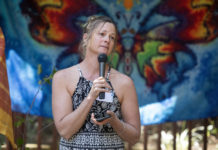
By Christian Kallen
The names on the letterhead strike terror in the hearts of city governments across the state. Malibu-based attorneys Shenkman & Hughes, since 2011, have made it their mission to call out local governments in California that elect officers by “at large” voting.
That happened just this month in Healdsburg, where the whole city was asked to vote for three candidates to fill three at-large seats on the City Council.
Citing the 2001 California Voting Rights Act (CVRA), the lawyers argue that law and public policy “disfavors” at-large voting, which (again according to the letter) “cause elected officials to ‘ignore [minority] interests without fear of political consequences.”
Since winning a case against the City of Palmdale in 2012, Kevin Shenkman and his wife Mary Hughes usually have only to file their letter urging cities to “voluntarily change its at-large system of electing its City Council” to achieve compliance, since it’s a rare city that will choose to spend hundreds of thousands of dollars in legal fees only to lose.
Critics say that Shenkman is shaking down jurisdictions for a $30,000 payment to avoid a lawsuit. And since 2016, more than 150 cities have taken that course of action, according to a December 2023 article in the San Francisco Chronicle. But it’s entirely legal, and if this is the result required by the state Voting Rights Act, then so be it.
Healdsburg Case

The letter sent to Healdsburg by certified mail was dated Sept. 28; it was stamped as Received by the city clerk on Oct. 3, opening the conversation among City Council members then running for election in the “at-large” model in use since the 19th Century.
The three who won re-election—David Hagele, Ariel Kelley and Ron Edwards—are secure in their at-large seats for four years, but there’s a good chance that the other two council seats (currently occupied by Evelyn Mitchell and Chris Herrod) will be filled by defined district elections in 2026 (with the other three districts following in 2028).
The transition to district voting began at Monday’s City Council meeting, Nov. 18. That was the date specified in the Shenkman letter to agree to a “voluntary change” to the current system, which would “limit its exposure” to only a $30,000 litigation fee.
It’s not just city councils that are being reshaped—school board districts, recreation areas and parks districts are also subject to the threat of litigation and, to avoid it, pay up.

The usual form of the letter includes a couple of pages of localized voting history and demographic information, proving that the lawyers have done their homework. In Healdsburg, the Shenkman letter suggests there is a demonstrable case that voting is not representative.
“As of the most recent data released by the United States Census Department, Latinos comprise 34.6% of the City’s population of 11,340. Yet, Latino representation on the City’s governing board has been sparse and fleeting to non-existent,” reads the letter in part.
Latino Representation
Despite the election of Abel De Luna to the City Council in the 1930s, it is fair to observe the presence of Latinos in city government has been rare. When Leah Gold resigned in 2020 over a dismissive comment she made about minority representation, she was replaced by Ozzy Jimenez, who chose not to run when his appointment expired in 2022.

Skylaer Palacios, a young Black Latina, did win a seat in an at-large election, but she herself stepped down after just two years. Matias Lopez Jr., then 23, also ran for City Council in 2022, but his votes came up short.
These recent historical cases are cited by Shenkman as evidence of “racially polarized voting,” and while there were certainly other factors at work in these cases, the city has chosen the easy, necessary path and agreed to move to district voting.
The timeline for doing so is quick, and the clock is ticking. At Monday’s meeting, City Attorney Samantha Zutler and City Manager Jeff Kay guided a wary council through their adoption of a resolution “outlining [the City’s] intention to transition from at-large to district-based elections.”
Public Hearings
Almost at once, a series of public hearings will begin to allow public input on the process of designing five districts, the first two of which must occur within 30 days of the Nov. 18 resolution. That first hearing will be Monday, Dec. 16; a second will follow on Jan. 13, 2025, in a special meeting of the City Council. The location of these hearings has not yet been set, but it will likely be either the Healdsburg Community Center (1557 Healdsburg Ave.) or the Senior Center (133 Matheson St.).
Two more public hearings will follow by March 17, including a public explanation and evaluation of proposed district mapping, under the guidance of a contracted demographer, the selection of whom is already underway, according to Zutler.
A fifth and final public hearing must occur by April 7, and a final map and process accepted before April 17. Kay promises a web page on healdsburg.gov that will provide all the information about this process shortly.
Neighboring Case
The drawing of those districts is sure to attract much interest and debate, as the recent process of redistricting in Windsor shows. As retiring town council member Debora Fudge described it, the process was, in a word, “difficult.”
“The process is interesting, but it’s difficult,” she said. “We were in meetings for three hours just moving these lines around.” After much discussion Windsor—roughly twice the size of Healdsburg in both area and population—opted for four district council members, with a fifth position being the mayor, elected at-large (by the entire electorate).
At the end of the process, though, Fudge was skeptical that anything had been accomplished. They had two Latina council members at the outset of redistricting, Esther Lemus and Reza Reynosa. Now, following this month’s election, there’s only one, Mayor Reynosa.








The photo of an empty City Council is a dream come true. Why pay the Henchman his $30k extortion fee? Just get rid of the City Council. We don’t need it.